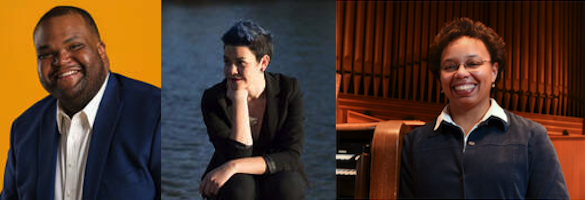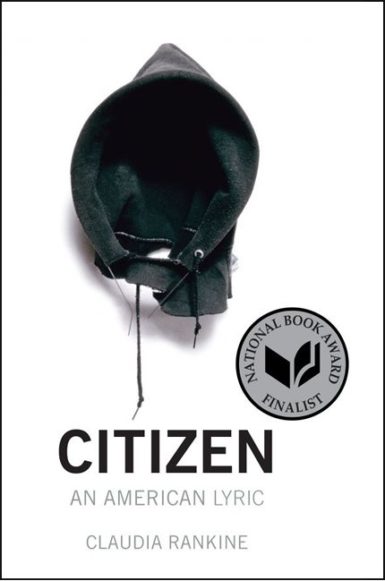by Jarrett Hoffman

Jones will join soprano Kristine Caswelch and pianist Nicole Keller at Trinity Cathedral next Wednesday, February 27 at 12:00 pm for a BrownBag Concert conceived in response to Claudia Rankine’s Citizen: An American Lyric. That 2014 finalist for the National Book Award in Poetry has been described as “an anatomy of American racism in the new millennium” (Parul Sehgal, Bookforum). A second performance takes place on Sunday, March 24 at 2:00 pm at the Main Branch of Lakewood Public Library.
Some quick background on the program: it’s the result of a web of partnerships among two local organizations, Music and Art at Trinity and the Center for Arts-Inspired Learning (CAL), one regional, Arts Midwest, and the National Endowment for the Arts (NEA). CAL was selected to host one of this year’s NEA Big Read programs, in which a series of events are planned around a book, with the purpose of broadening people’s understanding of the world, their community, and themselves.
CAL chose Citizen, and the 2019 Big Read Cleveland kicked off in late January with a conversation with Rankine herself. The events run through March, covering a range of topics related to race and writing (see the full list here).
After reading the book, Jones, Caswelch, and Keller got together to discuss it, and the two singers later met over coffee to choose repertoire. Both of them were struck by a section devoted to Serena Williams. “You see everything she has gone through in order to do what she loves,” Caswelch said. “You see the trauma of dealing with racism within a sport that hasn’t always accepted her.”
That section made the singers think of two songs by Florence Price: My Dream and Songs to the Dark Virgin, both on poems by Langston Hughes. To Caswelch, Songs to the Dark Virgin feels like a celebration of Williams and her body. “It’s just gorgeous,” she said. Jones quickly recalled the first lines of My Dream over the phone — “To fling my arms wide / In some place of the sun.”
Among female African-American composers on the program, Price is joined by Margaret Bonds and Cleveland-based composer Dolores White, as well as Lauryn Hill as an arranger. “We wanted to keep that voice,” Jones said, referring to the book’s author, Claudia Rankine, and its focus on Williams.
Two other pieces that came to mind for Jones were Bonds’ “I, Too” from 3 Dream Portraits, which also set poems by Hughes, and White’s We Wear the Mask, on a poem by Paul Laurence Dunbar.
“I think most people are familiar with that poem I, Too,” he said, quoting another line — this one about “the darker brother,” who’s usually sent to eat in the kitchen when company comes over, but decides that tomorrow, he’ll eat at the table. (It’s worth taking a moment to read the whole thing. It’s only 62 words.)
Interspersed among the solo works will be a couple of duets, including a blues piece by “Fats” Waller titled Black and Blue (What Did I Do). “It was made popular by Louis Armstrong,” Jones said, “and most people know it from the book Invisible Man by Ralph Ellison.”
Caswelch brought up the choice of John Adams’ duet “Este Pais” from his songplay I was looking at the ceiling and then I saw the sky. The libretto, she pointed out, is by writer and activist June Jordan, a black woman. But the song’s lyrics also spoke to Caswelch: she quoted lines to me about racism and violence. Then her thoughts turned to the 2014 shooting of Tamir Rice. “It’s something that we’re still talking about,” she said.
Still, she emphasized that the program, like the book, won’t be all sad — it’s also a celebration. “It’s about being proud,” Caswelch said. Genre will also vary. “There will be blues, sorrow songs — not just sacred spirituals that most people are familiar with, but actual sorrow songs — and also spirituals, some modern pieces, classical, and Broadway,” Jones said, “just to show different ways of telling the same story.”
Caswelch closed our conversation reflecting on what being part of the project has meant to her. “I’m mixed,” she said. “My grandparents actually had to come to Cleveland to get married because it was illegal for them as an interracial couple in the ‘60s. And my parents are interracial. So it’s been really great being asked to do this project because it’s kind of opened the door to exploring different facets of myself that I hadn’t really taken the agency to explore yet.”
And for the audience, she said, “I hope that people leave feeling thoughtful and wanting to go learn more about all these really amazing composers.”
Published on ClevelandClassical.com February 19, 2019.
Click here for a printable copy of this article



